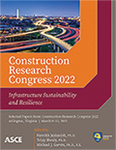Toward Sustainable Management of Disaster Debris: Three-Phase Post-Disaster Data Collection Planning
Publication: Construction Research Congress 2022
ABSTRACT
Reuse/recycling is a major component of a management system for disaster-generated debris. Prior studies have identified several factors that affect the feasibility of post-disaster recycling programs, such as the amount of debris, potential health hazards, community priorities, economics, and disaster-specific funding policies and regulations. In order to better assess each of these factors for sustainable debris planning, there is a need to collect post-disaster data that become available at different points in time after disaster events. However, such data are rarely captured in a timely manner. The SUstainable Material Management Extreme Events Reconnaissance (SUMMEER) organization was formed with funding from the National Science Foundation to develop solutions to post-disaster materials management by investigating the impact of extreme events with a focus on the reuse and recycling of disaster materials. In this study, we introduce the roles and mission of SUMMEER to the construction research community. We propose a three-phase post-disaster reconnaissance framework that facilitates the collection of time-sensitive data from disaster sites that are critical for sustainable debris management research: (1) response, (2) short-term recovery, and (3) long-term recovery phases. This framework provides guidance on effective, coordinated field reconnaissance for sustainable debris management research.
Get full access to this article
View all available purchase options and get full access to this chapter.
REFERENCES
Babbitt, C. W. (2019). “The role of clean technology research in disaster debris management.” Clean Technologies and Environmental Policy, Springer Berlin Heidelberg, 21(5), 923–924.
Brandon, D. L., Medina, V. F., and Morrow, A. B. (2011). “A case history study of the recycling efforts from the United States army corps of engineers hurricane katrina debris removal mission in Mississippi.” Advances in Civil Engineering, 2011(3).
Brown, C., and Milke, M. (2016). “Recycling disaster waste: Feasibility, method and effectiveness.” Resources, Conservation and Recycling, Elsevier B.V., 106, 21–32.
Brown, C., Milke, M., and Seville, E. (2011). “Disaster waste management: A review article.” Waste Management, Elsevier Ltd, 31(6), 1085–1098.
Cheng, C., and Thompson, R. G. (2016). “Application of boolean logic and GIS for determining suitable locations for Temporary Disaster Waste Management Sites.” International Journal of Disaster Risk Reduction, Elsevier, 20(October), 78–92.
Choi, J., Park, C., Yesiller, N., and Abichou, T. (2020). “A spatiotemporal framework for the resilience of a post-disaster waste management system.” Construction Research Congress 2020: Infrastructure Systems and Sustainability, ASCE, Reston, VA, 69–78.
Crowley, J. (2017). “A measurement of the effectiveness and efficiency of pre-disaster debris management plans.” Waste Management, Elsevier Ltd, 62, 262–273.
Denhart, H. (2009). “Deconstructing disaster: Psycho-social impact of building deconstruction in Post-Katrina New Orleans.” Cities, Elsevier Ltd, 26(4), 195–201.
Derrible, S. (2019). Urban Engineering for Sustainability. MIT Press.
Derrible, S., Yesiller, N., and Choi, J. (2019). Workshop on Post-Disaster Materials and Environmental Management. Alexandria, VA.
EPA. (2019). Planning for Natural Disaster Debris.
FEMA. (2012). Public Assistance Debris Operations Job Aid.
FEMA. (2007). Public Assistance: Debris Management Guide.
FEMA. (2011). National Disaster Recovery Framework.
Gabrielli, F., Amato, A., Balducci, S., Magi Galluzzi, L., and Beolchini, F. (2018). “Disaster waste management in Italy: Analysis of recent case studies.” Waste Management, Elsevier Ltd, 71, 542–555.
García-Torres, S., Kahhat, R., and Santa-Cruz, S. (2017). “Methodology to characterize and quantify debris generation in residential buildings after seismic events.” Resources, Conservation and Recycling, Elsevier B.V., 117, 151–159.
Ghannad, P., Lee, Y.-C., and Choi, J. O. (2021). “Prioritizing postdisaster recovery of transportation infrastructure systems using multiagent reinforcement learning.” J. Manage. Eng., 37(1), 04020100.
Habib, M. S., Sarkar, B., Tayyab, M., Saleem, M. W., Hussain, A., Ullah, M., Omair, M., and Iqbal, M. W. (2019). “Large-scale disaster waste management under uncertain environment.” Journal of Cleaner Production, Elsevier Ltd, 212, 200–222.
Hwang, S., Park, M., Lee, H.-S., Lee, S., and Kim, H. (2015). “Postdisaster interdependent built environment recovery efforts and the effects of governmental plans: Case analysis using system dynamics.” J. Constr. Eng. Manage., 141(3), 04014081.
Kasabdji, G. S., Pradhananga, P., and Elzomor, M. (2020). “Health and safety issues in post-disaster waste management: A case study in Nepal.” Construction Research Congress 2020: Safety, Workforce, and Education, ASCE, Reston, VA, 520–528.
De Magalhães, M. R., Lima, F. S., Campos, L., Rodriguez, C. T., and Maldonado, M. (2020). “Disaster waste management using systems dynamics: A case study in Southern Brazil.” Operations Management for Social Good, Springer International Publishing, 251–261.
Pradhananga, P., Kasabdji, G. S., and Elzomor, M. (2020). “A sustainable opportunity to utilize hazardous waste during post-disaster reconstruction phase: A case study of Nepal Earthquake.” Construction Research Congress 2020: Infrastructure Systems and Sustainability, ASCE, Reston, VA, 212–220.
United Nations. (2015). “SDGs: Sustainable Development Knowledge Platform.” <https://sdgs.un.org/goals>(Apr. 28, 2021).
Yesiller, N. (2011). “Decisive disaster debris management.” Waste Management World, 12(4), 62–67.
Zhang, F., Cao, C., Li, C., Liu, Y., and Huisingh, D. (2019). “A systematic review of recent developments in disaster waste management.” Journal of Cleaner Production, Elsevier Ltd, 235, 822–840.
Information & Authors
Information
Published In
History
Published online: Mar 7, 2022
Authors
Metrics & Citations
Metrics
Citations
Download citation
If you have the appropriate software installed, you can download article citation data to the citation manager of your choice. Simply select your manager software from the list below and click Download.
